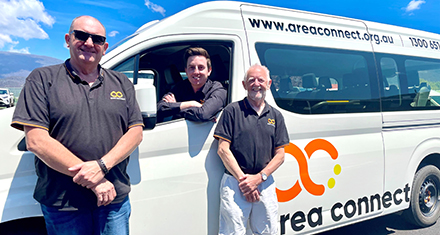Adrian Cowland remembers fondly as a child travelling distances with his dad, searching for billet wood for the Cooee brick yards, as well as collecting firewood for locals. This was his first foray into the forest industry. Source: Timberbiz
Fast forward some years, and Mr Cowland now supports those embarking on work or training in the forest and timber sectors through his role with Area Connect, which aims to support Tasmanians by transporting people to their place of work or training if access to transport is limited or unavailable.
Mr Cowland said the transport model is unique in that it assists job seekers and trainees to participate in the workforce by removing the barrier to transport.
“This means we can transport people to their place of work, job interviews, trade training centres and vocational training programs, and other recognised work-ready opportunities,” he said.
“We provide short term assistance until they can work through how they can get to and from work or training themselves.”
Mr Cowland observed that although the Tasmanian forest industry is slowly diversifying, it is still marked by a largely aging workforce.
“From my many years close to the industry and now indirectly engaged through my role with Area Connect, I would think the biggest issue for the industry would be finding young people to take on a role in this area as a career,” he said.
“A lot of this comes down to the remote area of the work and again the issue of transport to these areas.
“In my role with Area Connect we transport clients of all ages, many of whom may miss out on employment due to the cost and available of transport in rural areas. This assistance can make a huge difference to their lives.”
Area Connect has a fleet of vehicles located in Burnie, Devonport/Ulverstone, Glenorchy, Launceston, St Helens/Bicheno, the Huon Valley, Sorell, and Brighton/Derwent Valley. It can also tap into the fleet owned and managed by Community Transport Services Tasmania (CTST).
“The service is available to people who need to get to work or training if they don’t have access to private or public transport. People can use our service to get to work, interviews and appointments with employment providers, training at a trade training centre or other vocational training program,” Mr Cowand said.
“Importantly, we don’t compete with or duplicate existing transport services. A coordinator will discuss a person’s need and develop a free and personalised transport plan with them. This could include transport to their place of work or training or linking in with existing public transport available to them.”
Mr Cowland said that although the service is available regionally, Area Connect is a shared ride service and at peak periods (early morning and end of the day) they occasionally need to collect people up earlier than they would like, to ensure everyone makes it to their jobs on time.
“This is a challenge sometimes, but our team work hard on making this happen, and delivering on a service that meets the needs of all our clients,” he said.
“We all appreciate the fear of stepping outside our comfort zone and for some of these clients one of their biggest fears is the barrier to transport. It is rewarding to be able to help them and remove this barrier.”
Both businesses and individuals can contact Area Connect to discuss their transport needs. Further information on Area Connect can be found on the website www.areaconnect.org.au






